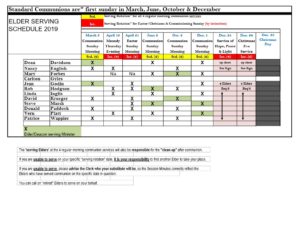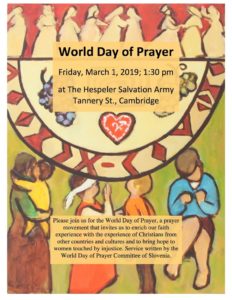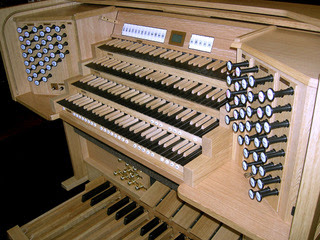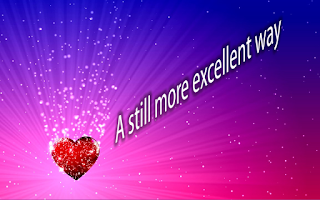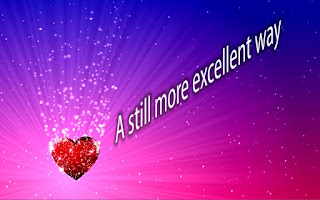Hespeler, 24 February 2019 © Scott McAndless
Genesis 45:3-11, Ps 37:1-11, 39, 40; 1 Cor 15:35-38, 42-50, Luke 6:27-38
| A |
little while ago I had a conversation with a woman who had been in an abusive marriage. We were talking about how you know when to intervene, what the signs are that somebody might be being abused and that you might need, at the very least, to ask them some questions. Of course, one of the signs that the literature often suggests that you should look for is bruises and scars. A black eye or a bruised cheek, they say, should be taken as a significant warning sign.
And I suppose that is true enough, but I will not soon forget what my friend said to me. “You know,” she said, “I never had a black eye or a mark on my face. My husband was calculating enough to know not to hit me where anyone would see it, but that didn’t mean he didn’t hit me in other places.”
And that conversation came back very powerfully to me when I first turned to our gospel reading this morning. To think of that cold, cruel and calculating violence being inflicted on a weaker victim is all that more disturbing when you hold it up against this advice of Jesus: “But I say to you that listen, Love your enemies, do good to those who hate you, bless those who curse you, pray for those who abuse you. If anyone strikes you on the cheek, offer the other also.”
These are, of course some of the most familiar words of Jesus. But they are words that we often treat in rather vague and symbolic terms. “Turning the other cheek,” has become a proverb, sometimes even a joke. We don’t usually talk about it in cases of actual physical violence. We don’t usually talk about it in practical terms at all. But I think it’s important to realize that when Jesus said it, he meant it practically. When he said it, there were people, both men and women, in the crowd listening who knew what it felt like to be struck and struck hard on the cheek and in many other places. If we cannot understand these words in very practical terms, I’m not sure how useful they are to us.
And there is, indeed, something in me that very strongly wants to reject these words of Jesus for use in practical terms because, let me tell you, if I ever had a woman who came to me and confessed to me that she was being physically abused, my advice to her would never be that she should respond to that abuse by inviting further abuse in any way. In fact, I would feel it to be my duty to do what I could to get her out of her situation if there was any chance of ongoing abuse.
I also know that passages like this one have been used by abusers to protect themselves and to keep their victims trapped in endless cycles of violence – to make the victims feel like they are obliged to accept it and not protest. And that is just not right.
But despite all of that, I do believe these words of Jesus are powerful and true and that they can apply in cases of abuse and, indeed, in the face of many other injustices. You do need to understand who Jesus was speaking to, though, and what he was really saying.
The people in the crowd that Jesus was preaching to that day – and indeed on most days – were mostly the lowest of the low. They were the people that, as we said last week, Jesus addressed directly as poor, hungry, weeping and oppressed. If they were abused, and they were regularly abused, they had no recourse and no one who would help them. For a slave, or a peasant, or a woman to be struck in that world was not considered to be illegal. It was just considered to be normal. And, while Jesus knew that what was happening to them was wrong, he could not promise that any human authority would help them. So this is what he did: he told them to respond to their abuse in such a way as to shame their abusers.
Ancient Mediterranean society was a culture that had shame and pride at its foundation. In every encounter, everything that happened, people in that society were continually judged as either honourable or ashamed. If they were judged as honorable their standing in society would be raised. But if they were judged shamefully, that could be a disaster for them and their families. Jesus told the poor and abused folks who were listening to him that, while they might not have any power to challenge the people who abused them, there were ways they could shame them.
That is whole point of Jesus’ teaching about turning the other cheek. Poor people, slaves and women were regularly struck on the face in that society, but they were struck in a particular way. The way you hit a slave was with the back of your hand, your right hand, because it would be considered shameful to touch anyone with your left hand because the left hand was considered to be unclean – something that I, as a left handed person find personally rather offensive. But that was how it was. That meant that abused people were regularly struck on the right cheek with the back of the right hand. (And, by the way, in the version of this saying that you will find in the gospel of Matthew Jesus actually specifies to the people “if anyone strikes you on the right cheek” because that was how they were always struck.) Everyone in the crowd would have known that. Just about everyone in the crowd would have been struck many times in their lives on the right cheek with the back of a hand.
So then, what is Jesus saying when he tells the people that if they are struck on the one cheek they should offer the other? They are actually putting their oppressor in a very difficult spot if they do that. Their oppressor might be only too happy to strike them one more time, but not on the other cheek. To do so, would mean either to strike them with the back of the left hand which, as I said would be shameful, or to give a front handed blow with the right hand, either a slap or a fist. To put someone in that kind of position in that society was to say there were equal to a slave or a woman and thus to bring shame upon them. I know that doesn’t make much sense to us but that was how things worked in that society.
Jesus next piece of advice essentially accomplishes the same thing. “From anyone who takes away your coat,” Jesus says, “do not withhold even your shirt.” There are also cultural considerations at work in that piece of advice. In that world, everybody basically only wore two pieces of clothing. There was a tunic worn against the body and a cloak worn over top. To make that something more that we could relate to, it was translated in the New Revised Standard Version as “shirt” and “coat.” The only problem with that translation is that if you or I were to take off our shirts and our coats, We would still be wearing pants or skirts at least and probably a bit more. Well, they didn’t wear pants. Pants hadn’t been invented yet. And everybody in the crowd would have immediately understood what it meant to take off your tunic and cloak in public. It would have meant that you were entirely exposed and naked.
Now, for you and for I to strip down in public, would be seen, probably by most of us as putting ourselves in a very shameful position. But here is another way in which their shame and honour society was different from ours. For them, when somebody appeared naked in public, it might be a very embarrassing situation, but it wasn’t necessarily seen as a shameful situation for the person who is stripped. It was seen as shameful for the person who caused them to become so. I could explain to you why this was so, there were certain legal realities and customs that came into play, but the bottom line is that this was just a very different culture that looked on these things in a very different way.
So really, a lot of the advice that Jesus was giving in these two pieces of wisdom was very much conditioned on the customs of his time and place. To simply take what he says and apply it directly to a very different culture doesn’t really make much sense. So what we need to do is extract from what Jesus says the underlying principles and then figure out how to apply them in our very different culture. So, what are the principles?
One thing that Jesus is saying is very clearly: do not answer violence or oppression with more violence. I know that not everyone will buy that nonviolent approach, but it was truly fundamental to Jesus’ approach to finding justice. He believed, and I personally agree, that more violence is not the solution to an injustice, and generally only makes things worse. In his case, he knew that the peasants and slaves who surrounded him would have only been slaughtered if they had dared to lift their hands against their oppressors. But Jesus seems to have been willing to extend that to just about any situation. Maybe there are some exceptions. Maybe there are some circumstances where violence can be part of the answer, but if he thought there were, Jesus never mentioned them.
But, though he rejects violence as a means of making things better, that does not necessarily mean that Jesus intends to leave his listeners simply at the mercy of powerful and evil people. He is asking them to rely (as he did in all things) upon God as their helper. And the actions that he suggests would have used the mechanisms of that society and culture – particularly the mechanism of shame – to take power away from abusers. Shaming their oppressors was one of the only ways that oppressed people could actually damage and expose the people who were harming them.
So what am I saying? Am I saying that when people are being abused, they should find ways to shame their abusers? No, not exactly. There are cases where that can still work. In many ways, the non-violent campaigns of Gandhi in India or the Civil Rights campaigns led by Martin Luther King Jr. did seek to expose the sins of their oppressors by bringing them public shame. But those were very similar situations where you had completely powerless people and shame was about the only tool that they had.
But generally speaking, I think, our goal is not to use shame to expose injustice. Our society is not structured around honour and shame like the society of Jesus was. (And I actually believe that that is a very good thing – such a structure had some horrible effects.) What I am saying is that a proper application of Jesus’ teaching to our modern society would be to say that if, say, a woman is being abused in her relationship, she must not simply seek to endure that abuse by continually turning another cheek and hoping that will change something. It will not. What she must do is follow the spirit of Jesus’ teaching and use whatever non-violent avenues are available to her to expose the evil in her abuser. And fortunately, our society has provided many very excellent avenues to do so including talking to friends, officials, police, seeking shelter and more. What Jesus was suggesting had, at its bottom line, the exposing of the evil that was in the oppressors and abusers as a part of the path to God’s salvation.
If you have suffered abuse in your life, the good news that Jesus has for you today is that you were not meant to suffer such a thing and Jesus wants to set you free from any remains of that abuse that continue to weigh you down. Do not be afraid to talk to somebody you trust if any of that is true of you. If you have someone in your life that you worry may be suffering abuse, the good news that Jesus has for you today is that God has put you there to support your friend and to give you the strength and wisdom to act should your friend choose to confide in you.
My friend who I spoke of at the beginning, she is strong today – amazingly strong. Her act of turning the other cheek was not that literal act – not just because her husband was too calculating to hit her in a visible place, but also because that is not an effective application of Jesus’ true teaching in such a situation today. She followed Jesus’ teaching by seeking help, by getting out and getting safe. She did it by finding healing in the power of God. Her journey is not over – such journeys rarely go quickly – but it is amazing to see God at work in such a life.

